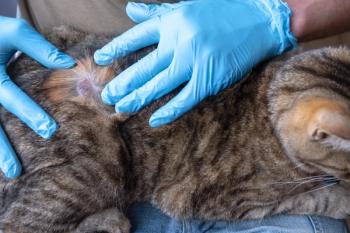
One Health Commission awaits National Academies study to help set agenda
One Health Commission awaits National Academies study to help set agenda.
He championed the One Health philosophy in his 2006 inaugural address as president of the American Veterinary Medical Association (AVMA), and now, three years later, Dr. Roger K. Mahr is leading the One Health Commission as it works to spread an international message of collaboration among human and veterinary health-care providers.
In an exclusive interview with DVM Newsmagazine, Mahr talked about the commission’s goals for 2010 and beyond.
Born from a “to-do” list and a warm endorsement by the AVMA and American Medical Association, the initiative has grown – a lot. It now has members from some 32 international health-care organizations, including the American Public Health Association, the Association of American Medical Colleges, the Association of Academic Health Centers, the Association of American Veterinary Medical Colleges and others.
This summer, the commission held its first board of directors meeting in Washington, during which Mahr was appointed executive director.
DVM Newsmagazine: What has been accomplished toward the development of the One Health concept over the past year?
Mahr: Based on the One Health Task Force’s 12 recommendations, we formed a basic outline for the initiative. We focused on establishing the commission first and the commission then took over the task-force duties. What is significant is the fact that One Health brings together multidisciplinary leadership from various entities. We are focused on strengthening the structure for implementing and developing our strategy.
Four primary activities have been undertaken initially. One was to establish the Council of Advisers to give direction and input on activities. Another step was to retain the services of a communications firm and establish a public-relations plan. We have done that, and an initial Web site has been established. The professional communications firm also will work toward helping further develop communications strategies to be put into place for the future.
We also are planning a national One Health Summit for November 17, 2009 in Washington. We are looking forward to the National Academy of Science’s study on One Health, which will provide an “outsider’s” perspective on the One Health concept that will help guide the commission as it moves forward.
DVM Newsmagazine: How satisfied are you in the interest level in One Health from the human and veterinary medical professions?
Mahr: There’s a broad-based coalition across the multiple professions involved. That base will be extended to further engage the involvement and the coordinated support of the various governmental agencies, as well as extending it further among academia and non-governmental organizations and industry.
The strength of our initial leadership is broad, and now we have the opportunity to strengthen and broaden it even more. We need to create national and international awareness of the power of One Health. We have a clear focus on engaging the international community in building our strategy and will illustrate the value of One Health through demonstrations and projects.
The commission will be a real facilitator and catalyst to engage the international community in the One Health concept.
DVM Newsmagazine: Has increased media attention about H1N1 and MRSA affected the One Health goal?
Mahr: It really calls for the recognized need for a collaborative effort directed toward surveillance, detection and control. We need to make that awareness clear as we look at the commonality of diseases such as cancer, obesity, diabetes, heart disease, joint disease, the various chronic disease that affect both animals and people. It really calls for more effective and efficient use of all of our various veterinary, human medical and financial resources we have available.
The fact that we have a changing environment that’s populated by interconnected animals and people creates significant challenges, such as H1N1. Finding answers to these challenges requires integrative solutions, and those solutions really call for collaborative leadership.
DVM Newsmagazine: What developments or changes can practitioners expect from One Health in the practice setting?
Mahr: I think one of the opportunities we have to integrate the various health professions is in the area of education -- both at the practitioner level and by integrating continuing education across the various health professions through joint symposiums and workshops.
Taking it to the college level is significant. One of the recommendations that is part of the goals we’re working through from the task force is to engage students in the One Health concept early. One Health resonates with students, so it’s a great opportunity to focus at that level.
There is the need for closer communication between veterinarians, doctors and public health. Certainly, the H1N1 virus underscores that need. The concern about food-borne illness and various zoonotic diseases are examples of when the need for communication becomes more obvious.
As we look to the future and students are trained and educated on the One Health principles, this will become a part of their professional culture. They will have the training and the mandate of collaboration and cooperation with their various colleagues in the other professions.
DVM Newsmagazine: What do you think is the greatest challenge to the One Health cause?
Mahr: We’re in a critical need now to gain support of various key stakeholders to provide resources. We’re further developing our three-year business plan, which will provide focus for the commission. When it’s complete, we will put together a proposal to reach out to funding resources to provide that support.
The current state of the economy is making it difficult to find resources to support the One Health concept, but it illustrates the need to find new ways to share resources among the many branches of health care. The economy empowers the need for this to happen. Part of our effort will be to create awareness among political leadership and governments to look for ways in which funding can bring a focus on the collaboration needed to achieve our One Health principles.
DVM Newsmagazine: What would you most like to achieve for One Health in the next year?
Mahr: We would like to call for collaborative leadership and extend the leadership base to involve more disciplines and professions related to health sciences coming from academia, with government providing focus, direction and mandate for the needs.
One of the key activities is the National Academies’ study. This will be a major accomplishment and achievement to have an independent study with credibility that actually will define a road map for this concept.
The results of the study will include a privatized research agenda that will provide for research integration and will help advance solutions to integrated challenges and problems we have between animal, human and environmental health.The study will affirm and substantiate the value of One Health and identify specifically where training, research and education need to take place and how those can take place. We envision that that study, once completed (most likely in 2011), will really define further direction and focus for the One Health Commission.
Newsletter
From exam room tips to practice management insights, get trusted veterinary news delivered straight to your inbox—subscribe to dvm360.






